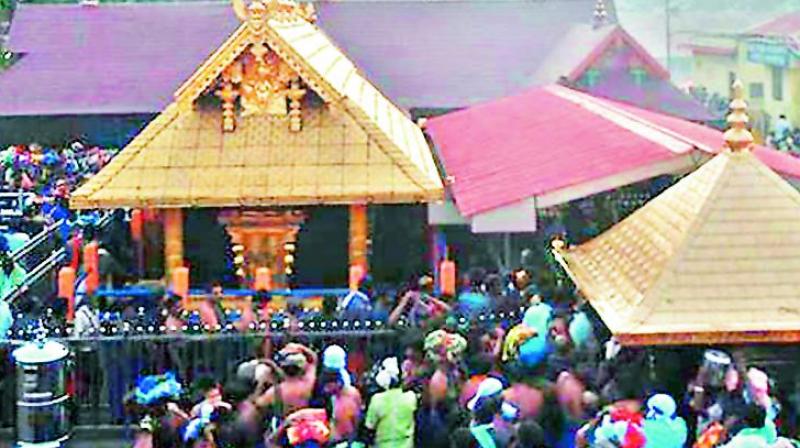Sabarimala doors thrown open to all women
Bond with God can't be defined by biology, rules Supreme Court.

New Delhi: The Supreme Court, in a historic verdict on Friday, allowed the entry of women of all ages into the Sabarimala Ayyappa temple in Kerala. Till now, women in the 10-50 age group were denied entry on the ground that they were of menstruating age. The court termed this centuries-old Hindu religious practice as illegal and unconstitutional and paved the way for women’s worship at par with men. A Constitution Bench of Chief Justice Dipak Misra and Justices Rohinton Nariman, A.M. Khanwilkar, D.Y. Chandrachud and Indu Malhotra, by a majority of 4:1, held that denial of entry to women only on the ground that they were menstruating violated Article 14 of the Constitution — the right to equality.
The CJI said that in no scenario, it can be said that exclusion of women of any age group could be regarded as an essential practice of the Hindu religion. Interestingly, the only woman in the bench, Justice Indu Malhotra, was the sole dissenter to the majority verdict. In his main verdict, the CJI said there couldn’t be any discrimination in approach to divinity and spirituality. “Man can’t dominate views of worship and biological factors can’t be a legitimate ground to deny women the right to worship,” the Chief Justice said, adding that a patriarchal mindset had resulted in this prejudice against women.
“Women no way are inferior to men. On one hand, women are worshipped as Goddesses, but there are restrictions on the other hand. Relationship with God can’t be defined by biological or physiological factors,” he said. “Its (ban’s) effect is to impose the burden of a man’s celibacy on a woman and construct her as a cause for deviation from celibacy,” says the landmark judgement.
He rejected the submission that devotees of Ayyappa constituted a separate section of Hindus. Custom and practice must allow everyone to offer worship without discrimination, he said, adding: “The courts must not grant legitimacy to religious practices which derogate women.” The CJI rejected the submission that devotees of Ayyappa constituted a separate section of Hindus. Custom and practice must allow everyone to offer worship without discrimination, he said, adding: “The courts must not grant legitimacy to religious practices which derogate women.”
Justice Misra said: “Women are in no way inferior to men. On one hand, women are worshipped as goddesses, but there are restrictions on the other hand. Relationship with God can’t be defined by biological or physiological factors. Banning entry of women to the shrine is gender discrimination. The practice of exclusion of women of the 10-50 age group cannot be regarded as an essential religious practice. Devotion cannot be subjected to discrimination. Patriarchal notions cannot be allowed to trump equality in devotion. Religion is a way of life - basically to link life with divinity. The Sabarimala temple’s practice violates the rights of Hindu women.”
The CJI said that in no scenario, it can be said that exclusion of women of any age group could be regarded as an essential practice of the Hindu religion. On the contrary, it was an essential part of the Hindu religion to allow Hindu women to enter a temple as devotees and followers and offer prayers to the deity.
In the absence of any scriptural or textual evidence, “we cannot accord to the exclusionary practice followed at Sabarimala temple the status of an essential practice of the Hindu religion”.
The CJI held that rights guaranteed under Article 25(1) had nothing to do with gender or, for that matter, certain physiological factors specifically attributable to women and the denial of entry to the temple denudes them of their right to worship. He observed that there is nothing on record to show that the devotees have any common religious tenets peculiar to themselves, which they regard as conducive to their spiritual well-being, other than those, which are common to the Hindu religion.

